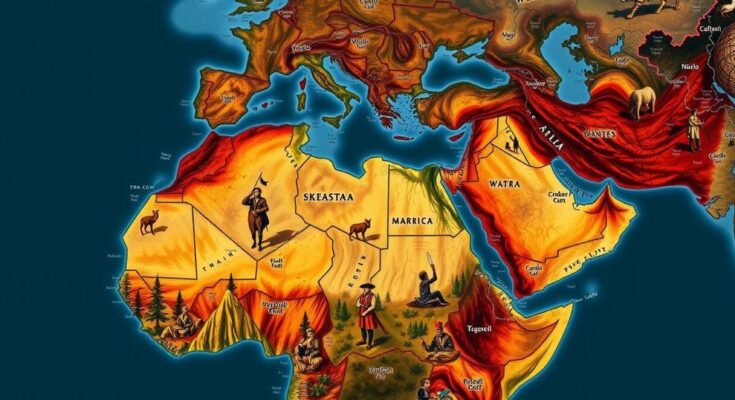The recent trilateral summit in Asmara among Egypt, Eritrea, and Somalia indicates a significant shift in the Horn of Africa’s geopolitics, primarily geared towards countering Ethiopia’s influence amid ongoing tensions regarding the Grand Ethiopian Renaissance Dam. The meeting emphasized regional cooperation while highlighting military alliances that could change the existing power dynamics in the region.
The recent summit held in Asmara among Egypt, Eritrea, and Somalia signifies a pivotal shift in the geopolitical landscape of the Horn of Africa, a region historically characterized by instability and competition. This trilateral meeting sought to foster unity in response to emerging security threats, notably Ethiopia’s influential role as a neighboring power. While the summit purportedly aimed to enhance regional cooperation and autonomy, it primarily served to coordinate efforts to counter Ethiopia’s growing presence and influence, particularly amid ongoing tensions surrounding Ethiopia’s management of the Grand Ethiopian Renaissance Dam. During the summit, leaders Isaias Afwerki of Eritrea, Abdel Fattah al-Sisi of Egypt, and Hassan Sheikh Mohamud of Somalia emphasized the need to protect sovereignty and resist outside interference in their joint statement. Ethiopia remains central to these dynamics due to its historical complexities, particularly its controversial engagements with Somaliland, which has led to friction with Somalia, a nation yet to recognize Somaliland’s independence post-1991. Concurrently, Somalia’s military agreement with Egypt provides further military support against the al-Shabaab insurgency, suggesting a warming relationship between Cairo and Mogadishu as Ethiopia’s ties with its neighbors appear to weaken. Moreover, the ongoing tensions between Egypt and Ethiopia over the Renaissance Dam underscore the motives behind this trilateral engagement. Egypt regards the dam, which is situated on the Blue Nile, as a critical threat to its water security, resulting in stalled negotiations. Consequently, Egypt’s military presence in Somalia, along with the provision of arms, signifies a strategic initiative to counter Ethiopia’s influence within the Horn. For Eritrea, aligned with Egypt, this new partnership symbolizes an opportunity for enhanced power and regional significance, particularly given its strategic location at the Bab el-Mandeb Strait. The Asmara summit marks a strategic shift, suggesting an inclination towards military collaboration amongst Egypt, Eritrea, and Somalia, aimed principally at offsetting Ethiopia’s ascendancy. Despite not sharing direct borders, Egypt’s involvement in regional affairs raises significant concerns, potentially positioning itself for indirect confrontations through Eritrea against Ethiopia. As the alliance deepens, the risk of border clashes and escalated tensions involving extremist elements from Somalia looms significant. Thus, Ethiopia faces an urgent need to reassess its diplomatic strategies and strengthen relations with both regional and international partners. Engaging with global organizations and securing the backing of key players such as the United States is imperative for Ethiopia to navigate this complex landscape. Moreover, Ethiopia’s proactive approach in managing Nile water diplomacy will be essential in mitigating tensions and shaping its security trajectory in an increasingly precarious environment.
The Horn of Africa is a region marked by ongoing conflicts, historical grievances, and shifting allegiances that have continuously influenced power dynamics among its nations. Ethiopia, being the only nation geographically situated in the Horn of Africa without a coastline, significantly influences regional politics, especially with its involvement in tense situations, such as the Grand Ethiopian Renaissance Dam conflict with Egypt. Eritrea’s prior isolation and authoritarian governance have shaped its efforts to engage actively in regional politics following its independence from Ethiopia. The relationships among these nations are heavily interlinked with historical rivalries and external pressures, which now manifest in the newly formed alliance between Egypt, Eritrea, and Somalia as they attempt to counter Ethiopia’s influence in the region.
In summary, the recent summit between Egypt, Eritrea, and Somalia underscores a significant evolution in the Horn of Africa’s geopolitical alliances, primarily as a direct response to the perceived challenges posed by Ethiopia. The alignment among these countries indicates a potential reconfiguration of power within the region, as they seek to enhance their military and strategic cooperation to maintain stability. However, the efficacy of this partnership in fostering long-lasting peace remains uncertain, and Ethiopia’s proactive diplomatic engagement will be crucial in addressing the emerging challenges.
Original Source: thehill.com




